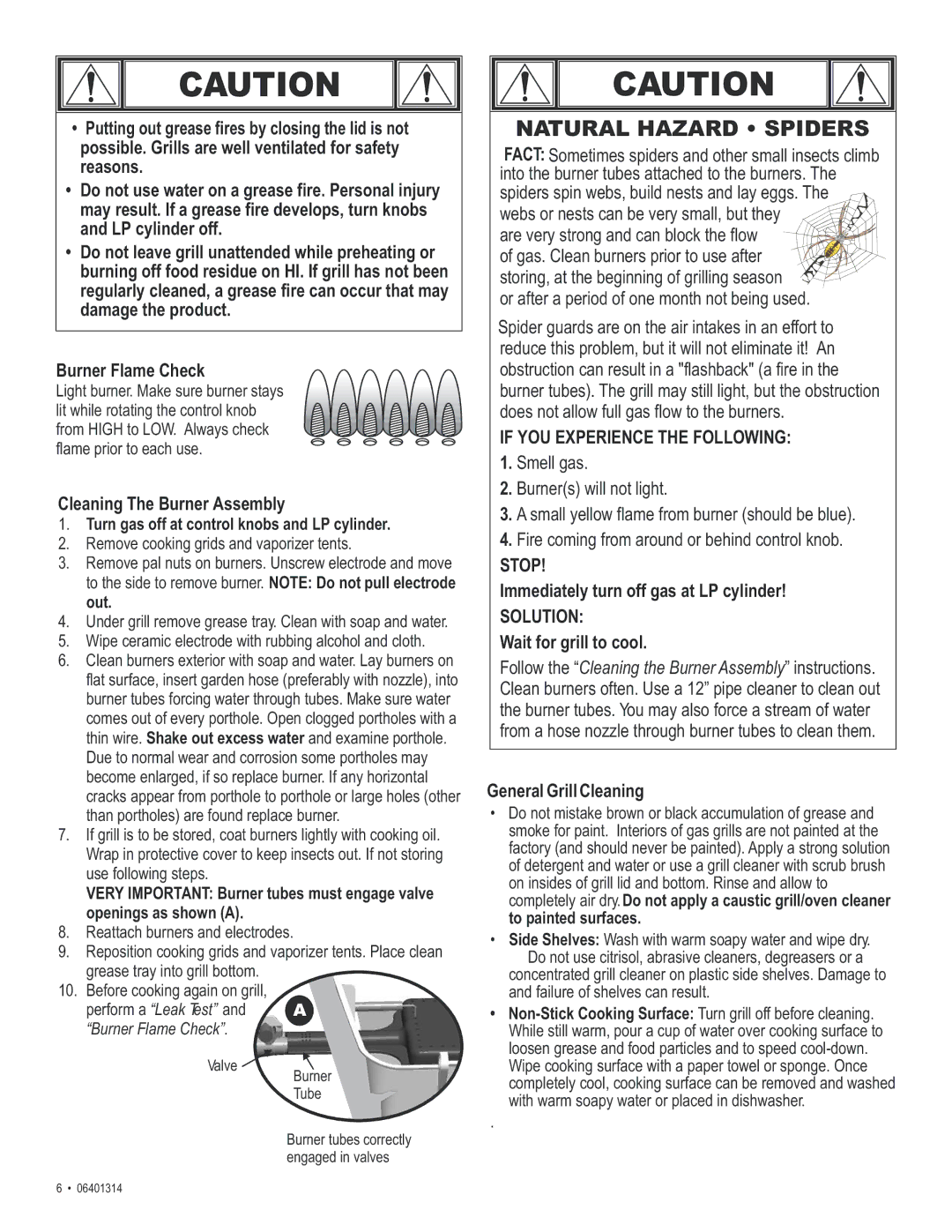
CAUTION
•Putting out grease fires by closing the lid is not possible. Grills are well ventilated for safety reasons.
•Do not use water on a grease fire. Personal injury may result. If a grease fire develops, turn knobs and LP cylinder off.
•Do not leave grill unattended while preheating or burning off food residue on HI. If grill has not been regularly cleaned, a grease fire can occur that may damage the product.
Burner Flame Check
Light burner. Make sure burner stays lit while rotating the control knob from HIGH to LOW. Always check flame prior to each use.
Cleaning The Burner Assembly
1.Turn gas off at control knobs and LP cylinder.
2.Remove cooking grids and vaporizer tents.
3.Remove pal nuts on burners. Unscrew electrode and move to the side to remove burner. NOTE: Do not pull electrode out.
4.Under grill remove grease tray. Clean with soap and water.
5.Wipe ceramic electrode with rubbing alcohol and cloth.
6.Clean burners exterior with soap and water. Lay burners on flat surface, insert garden hose (preferably with nozzle), into burner tubes forcing water through tubes. Make sure water comes out of every porthole. Open clogged portholes with a thin wire. Shake out excess water and examine porthole. Due to normal wear and corrosion some portholes may become enlarged, if so replace burner. If any horizontal cracks appear from porthole to porthole or large holes (other than portholes) are found replace burner.
7.If grill is to be stored, coat burners lightly with cooking oil. Wrap in protective cover to keep insects out. If not storing use following steps.
VERY IMPORTANT: Burner tubes must engage valve openings as shown (A).
8.Reattach burners and electrodes.
9.Reposition cooking grids and vaporizer tents. Place clean grease tray into grill bottom.
10.Before cooking again on grill,
perform a “Leak Test” and | A |
“Burner Flame Check”. |
|
Valve ![]()
Burner
Tube
Burner tubes correctly engaged in valves
6 • 06401314
CAUTION
NATURAL HAZARD • SPIDERS
FACT: Sometimes spiders and other small insects climb into the burner tubes attached to the burners. The spiders spin webs, build nests and lay eggs. The ![]()
![]() webs or nests can be very small, but they
webs or nests can be very small, but they ![]()
![]()
![]()
![]()
![]()
![]()
![]()
![]()
![]() are very strong and can block the flow
are very strong and can block the flow ![]()
![]()
![]()
![]()
![]()
![]()
![]()
![]()
![]()
![]()
![]()
![]()
![]()
![]() of gas. Clean burners prior to use after
of gas. Clean burners prior to use after ![]()
![]()
![]()
![]()
![]()
![]()
![]()
![]()
![]()
![]()
![]() storing, at the beginning of grilling season
storing, at the beginning of grilling season ![]()
![]()
![]()
![]()
![]()
or after a period of one month not being used.
Spider guards are on the air intakes in an effort to reduce this problem, but it will not eliminate it! An obstruction can result in a "flashback" (a fire in the burner tubes). The grill may still light, but the obstruction does not allow full gas flow to the burners.
IF YOU EXPERIENCE THE FOLLOWING:
1.Smell gas.
2.Burner(s) will not light.
3.A small yellow flame from burner (should be blue).
4.Fire coming from around or behind control knob.
STOP!
Immediately turn off gas at LP cylinder!
SOLUTION:
Wait for grill to cool.
Follow the “Cleaning the Burner Assembly” instructions. Clean burners often. Use a 12” pipe cleaner to clean out the burner tubes. You may also force a stream of water from a hose nozzle through burner tubes to clean them.
General Grill Cleaning
•Do not mistake brown or black accumulation of grease and smoke for paint. Interiors of gas grills are not painted at the factory (and should never be painted). Apply a strong solution of detergent and water or use a grill cleaner with scrub brush on insides of grill lid and bottom. Rinse and allow to completely air dry. Do not apply a caustic grill/oven cleaner to painted surfaces.
•Side Shelves: Wash with warm soapy water and wipe dry. Do not use citrisol, abrasive cleaners, degreasers or a
concentrated grill cleaner on plastic side shelves. Damage to and failure of shelves can result.
•
.
